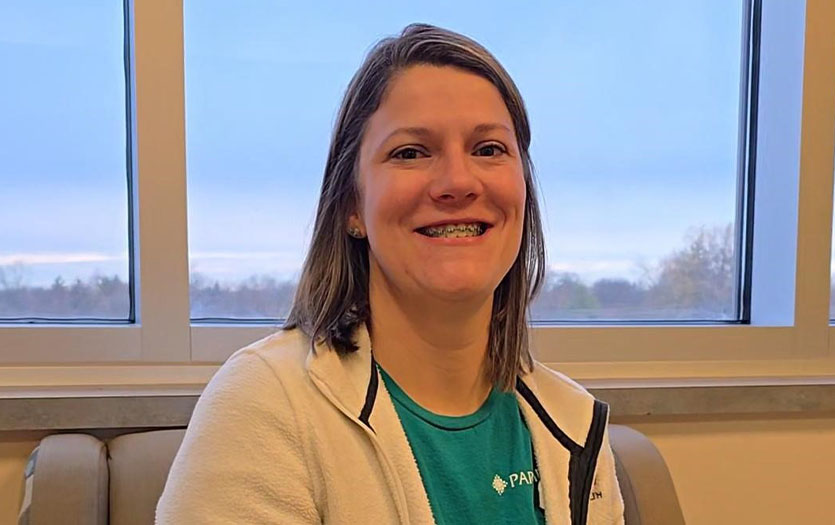.jpg)
Enjoy this monthly mindfulness post from Dave Johnson, PhD, CNS-BC, LMFT, employee assistance specialist.
“Sticks and stones may break my bones
But words will never harm me.”
As a nurse and, more recently, as a therapist, I have heard stories within the safety of my office from the perspective of people who were being bullied. Whether I’m listening to a child or an adult, the caustic impact of name calling and personal degradation can be a challenge, especially when it has become part of the fabric of one’s own thinking mind. It’s simple to tell a child to reach for a memorable lyric, like “Sticks and stones …”, but for many, turning off negative cognition is easy to understand but a challenge to actually implement.
Often, adults have no idea where their “stinkin’ thinkin’” and negative internal self-talk originated. For some, they simply have succumbed to the notion that they have poor self-esteem, and inherently blame themselves for not having thicker skin or willpower to override negative self-talk.
Of course, problem-solving for bullying behavior or an abuse of power is often a necessary first step. Dealing with the aftermath of negative self-ideation by using a bit of counseling and some training in mindfulness and self-compassion can be quite helpful. Sitting meditation is a great ally to strengthen the mindful muscle in softening negative self-talk and enhancing personal resilience.
Mindfulness practitioners frequently use the breath as an anchor in their practice, but I find that actually befriending a word or phrase to use as an anchor can also be helpful, especially in dealing with negative cognition. Words from self and others can harm, but words and self-soothing messages can also heal.
I thought it might be useful to simply expand in a concrete manner what using self-compassion and a word or phrase as an anchor might look like in a formal mindfulness practice.
- Sit. For this meditation, sit on the floor with a yoga mat or in a straight back chair, and get comfortable. Some meditators say sit in a dignified posture, but I believe the essence of finding and appreciating and noticing how one is sitting comfortably is what is needed. Closing your eyes can often be helpful for quieting the mind. I practice in natural light, but some people like a dimmed room or candlelit space.
- Breathe. Take 2-3 slow and gentle cleansing breaths. Notice the movement of air coming in through the nose, which cleans, moistens and warms the air. Slowly exhale as if you are blowing through a straw. This helps to bring a cascade of slowing down to our breathing and our bodily functions. This prepares you for a formal mindful meditation practice session. Recognize how the body breathes effortlessly on autopilot without our noticing, but for a few deep breaths you can enter an awareness of intentionally breathing your body. Notice the flow and rhythm and pattern with this intentional slowing.
- Choose a healing or soothing word to ponder. Often it is best to choose a word and commit to this word throughout the practice session. This prevents your mind from second-guessing or flip flopping words, and hinders you from obsessing on finding a different word once the practice has begun. I have used the word “one” for years; it has a spiritual meaning for me. I have patients who have chosen words like “gentle”, “kind”, “love”, “tender”, “slow”, “relax”, “peace”, “mercy”, “trust”, “God”, “Jesus” and other spiritual names. Healing phrases folks have used, include “let it be”, “be still”, “have mercy”, “let go and let God”, “I am loved”, etc. One can explore different words or phrases in ongoing practice sessions, but having a go-to word or phrase that you use over and over seems to make the process easy for to repeat again and again.
- Savor. It may seem a bit odd, but I encourage folks to savor their word or phrase by gently rolling it back and forth in their mind in the rhythm or pattern of their breath. If the mind becomes engaged in other thoughts or preoccupations, ever-so-gently return to the soothing, chosen word.
People often complain that it’s challenging when they realize how often their mind drifts and they become discouraged. I reinforce that this is why we call mindfulness a practice. Gently and kindly note that the mind has drifted and come back to the chosen word – this is the purpose of the exercise. Strengthening the mindful muscle takes time. Learning to be kind and compassionate with self is part of the practice. Think of how you would be kind and gentle to a good friend or family member and how this same attitude of loving kindness can be carried forward and given to yourself.
- Be still. After a 10-20-minute practice session, remain in silence with your eyes open for another minute. Fully engage an appreciation of all senses (sight, sound, smell, taste, feeling). Appreciate a bit of slowing. I often have my cup of tea or coffee nearby or a scripture or journal to ponder or linger a bit longer. For me, this is the most important part of the practice, re-entering my life a bit refreshed, renewed and connected.
As I finish some of my thoughts on using a healing word, I am flooded by memories of many clients who throughout the years had great emotional pain often inflicted by the words of others. I watch a media frenzy today and how words can heal and divide. I recognize that I have no power to control the words of others, but I can choose to listen or not to, to tune in or tune out. My power and resilience starts with me noticing and choosing words that heal and bring hope.
I recall a quote from Lao Tzu, “Watch your thoughts, they become your words; watch your words, they become your actions; watch your actions, they become your habits; watch your habits, they become your character; watch your character, it becomes your destiny.”
Other resources
For a free 1:1 in person or phone consultation with Dr. Dave or to find out about more on Mindfulness & Stress Management programs, contact the Parkview Center for Healthy Living at 260-672-6500. Follow our Classes and Events to learn about group mindfulness sessions. Dr. Dave also provides on-site guidance for teambuilding and transformational leadership, among other topics. To learn more about Employee Assistance Programs for your company, call Business Development at 260-373-9013. Mindfulness-based stress reduction (MBSR) practice has been extensively researched and proven helpful for coping with stress and change, grief, healthy eating patterns, pain, anxiety, depression and many other chronic disease and autoimmune disorders.
Germer, C. K. (2009). The mindful path to self-compassion: Freeing yourself from destructive thoughts and emotions. New York: Guildford Press.
Follow Integrate Mindfulness on Facebook, for posting of mindfulness and healing exercises from Dr. Dave.



